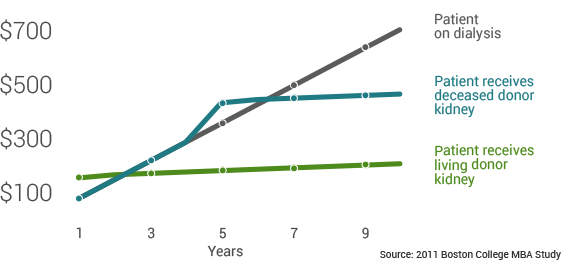
Increased Life Expectancy
Kidney transplantation is a long-term solution to kidney failure, as recipients are expected to live 10-15 years longer than patients on dialysis. Additionally, it’s been proven that people who receive a kidney before needing to go on dialysis (preemptive transplantation) live longer than recipients who waited until after dialysis.

Better Health
Dialysis patients report frequent feelings of fatigue as toxins build up in their body. They also have reduced independence because they have to visit the dialysis center. Kidney transplant recipients, on the other hand, report having more energy, a less restricted diet, more freedom from clinic visits, and fewer health complications than patients on dialysis. They are able to participate in more activities, leading to a better overall feeling of well-being.










